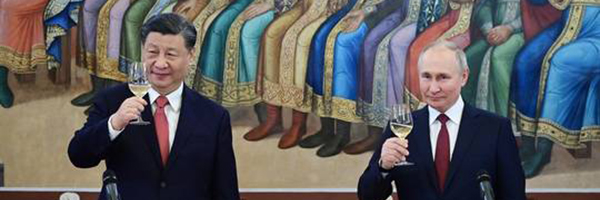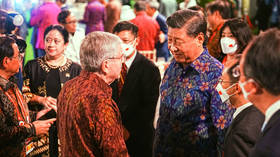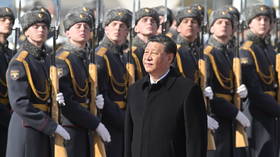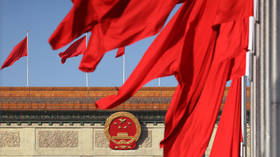Fyodor Lukyanov: Here’s the real reason why Russia and China want to replace the US-led international order
 Fyodor Lukyanov, RT, March 23, 2023 —
Fyodor Lukyanov, RT, March 23, 2023 —
The two powers share the same goal, but circumstance dictates they have to take different roads to make it happen.
Russia and China don’t fit into the international system built under Western auspices after the Cold War. They are therefore in favor of replacing it. And it is easier to change it together.
“We hope the world will become a better place, and we have reason to believe it will. At the same time, we are well aware that the future is bright, but the road there is winding.”
This statement by Xi Jinping, which echoes a similar argument made by Mao Zedong in the 1940s, is exactly ten years old. The recently elected President of China was paying his first official visit to Moscow, during which he gave a lecture at MGIMO University.
A decade later, Xi returned to Russia this week at the start of his third term at the helm, and you could say he was right on the money then. The past few years have been full of twists and turns, and the world is about to take perhaps one of its sharpest in more than half a century. Meantime, the rhetoric of the Chinese leadership has changed little.
It is a peculiarity of our giant neighbor’s political culture that the language is always extremely polished, so that no one can pick at it. Only subtle connoisseurs can pick up on nuances that serve as indicators of changes in the political line. And even then, it is mostly related to China’s internal development. The message conveyed to the outside world hardly fluctuates at all. Of course, this does not mean that the actual course is not changing.
What has happened in the ten years since that visit, which was also very significant and meaningful? In China, Xi’s reign has been a time of rethinking the trajectory of development. The golden era of globalization, from which Beijing benefited enormously, essentially ended with the 2008 crisis. It then became clear that the global system was beginning to experience serious disruptions, the management of which would be the main task of every major player.
For their own benefit and at the expense of others, the Chinese coped with the recession faster and easier than others and strengthened their position. And the old model, in which the US was comfortable and even encouraged by China’s growth and benefited from it, has become no longer in America’s interest. Beijing began to be perceived as the main competitor capable of challenging the world hegemon. And there has been only one conclusion to be drawn – containment on all fronts.
In addition to changing external circumstances, Xi’s own outlook has played a role. He is more oriented than his predecessors to China’s own experience, from classical philosophy to the various stages of socialist construction. The fusion of ancient tradition with influences from the modern People’s Republic of China already creates a distinctive construction that cannot be suspected of being a transition to a Western-style system (in an earlier period of reform, such expectations existed amongst the US and its allies).
Xi’s decade was marked by a rapid escalation of all the world’s contradictions. The CCP’s plan was initially to strengthen China in order to secure its development and, as far as possible, avoid getting involved in conflicts. Capacity-building also entails an increase in self-confidence. And the provocative actions of external powers, which have their own ways of responding to the same unsettling circumstances, have forced Beijing to respond.
China, battered by the coronavirus pandemic, has approached the Ukrainian crisis with the understanding that an era of calm is over. And further success is possible not by avoiding international conflicts, as Beijing used to prefer, but by engaging in them in a meaningful way. Moreover, in terms of its accumulated capabilities, China is better prepared for times of turmoil than many others. This does not remove the risks, and it does not eliminate them.
In Russia, the last ten years have been a period of no small reversal. The logic is partly similar, although the circumstances are of course very different. For China, however, the late 20th and early 21st century was a period of unprecedented growth by any measure, while for Russia it was a period of deep decline and difficult recovery. Nevertheless, Russia also faced the exhaustion of its previous development model. Since the late 1980s, the focus has been on integration into the international system dominated by the West. Russia has made progress along this path (though not to the same extent as China). In the late 2000s and especially in the early 2010s, however, its limitations became apparent.
Firstly, economic: the external actors were naturally not interested in seeing Russia rise above a certain level, and there was a lack of will on their part to ensure that this barrier could be overcome independently.
Second, the geopolitical conflict began to escalate rapidly. Russia had reached a ceiling here, too. Its partners did not want to help it any further, and it proved impossible to reach the next floor on its own, while maintaining the basic parameters of the previous course. All the more so because Moscow, like Beijing, felt that the very system into which it had been asked to integrate in previous decades was beginning to change.
The above is, of course, a rough sketch that leaves out a lot of nuance. But it allows us to understand why the current rapprochement between Moscow and Beijing, apart from various opportunistic bases, has a fairly solid foundation. Our countries, each for its own reasons, do not and will not fit into the international system built under the auspices of the West after the Cold War. That is why they are in favor of replacing it, and it is easier to change it together.
The Chinese are meticulous with their wording, polishing it to a dazzling shine that leaves no room for superfluous thoughts. And they have always been careful to avoid the terms “alliance” or “union” because they imply something binding, which is not their approach at all.
After his talks with Putin, Xi said: “Sino-Russian relations have gone beyond bilateral relations and are of vital importance to the modern world order and the destiny of mankind.”
In other words, he sees them as ties that constitute a holistic phenomenon and, as such, serve as a factor in world order. This is the closest the Chinese leader has come to describing alliance-type relations. A qualitative shift.
*
Fyodor Lukyanov, the editor-in-chief of Russia in Global Affairs, chairman of the Presidium of the Council on Foreign and Defense Policy, and research director of the Valdai International Discussion Club.



